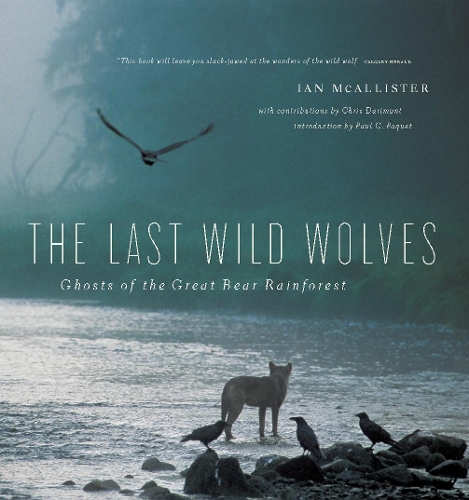
The Last Wild Wolves: Ghosts of the Rain Forest
(Paperback)
Publishing Details
The Last Wild Wolves: Ghosts of the Rain Forest
By (Author) Ian McAllister
Introduction by Paul C. Paquet
Contributions by Chris Darimont
Greystone Books,Canada
Greystone Books,Canada
19th May 2020
Canada
Classifications
General
Non Fiction
599.77309711
Physical Properties
Paperback
192
Width 266mm, Height 279mm
Description
For seventeen years, Ian McAllister has lived on the rugged north coast of British Columbia, one of the last places on the planet where wolves live relatively undisturbed by humans. The Last Wild Wolves describes his experiences over that period following two packs of wolves, one in the extreme outer coastal islands and another farther inland inthe Great Bear Rainforest.
The behaviour of these animals, which depend on the vast old-growth forest and its gifts, is documented in words and pictures as they fish for salmon in the fall, target seals hauled out on rocks in winter, and give birth to their young in the base of thousand-year-old cedar trees in spring. Most interestingly, scientific studies reveal a genetically distinct population of wolves, one that is increasingly threatened by human incursions.
Author Bio
Born in Vancouver, Ian McAllister has become a leading Canadian advocate for coastal rainforest and marine wildlife protection. An award-winning author and photographer he is the founder of the wildlife conservation group Pacific Wild. He has spent the last twenty years documenting large carnivores that inhabit the rugged north coast of British Columbia. His research has been featured in many international television documentaries, films, magazines and other publications.
He is the author of four books on the carnivores of the BC coast and has been the recipient of a number of awards including the (NANPA) North American Nature Photographers Vision Award, along with his wife, Karen McAllister, he was named one of the leaders for the 21st Century by Time magazine. He is a member of the International League of Conservation Photographers (iLCP) and lives with his family on the central coast of British Columbia in Heiltsuk First Nation territory. His current work focuses on the predator prey relationships, inspired by salmon, along the north Pacific.
Dr. Paul Paquet holds a PhD in zoology from the University of Alberta and is an internationally recognized authority on wolves. He is an associate professor in the Faculty of Environmental Design at the University of Calgary. He lives in Saskatchewan.
Chris Darimont spent his formative years exploring the forests and tide pools of Canadas west coast islands. Never far behind him was Kala, his familys loyal canine companion. This legacy prepared Chris well to initiate and lead the research team that uncovered the fascinating natural history and science featured in The Last Wild Wolves. Chris worked closely with Ian to seamlessly integrate his teams findings into the books first-person narrative.
The wolf project research earned Chris a PhD. from the University of Victoria, and an opportunity to cultivate a decade-long relationship with the Raincoast Conservation Foundation, which supported the research since its inception in 1998.
Chris is considered an emerging expert not only in Conservation Biology but also in informed advocacy, in which the Raincoast team advocates for wolves and their precious rainforest in multiple public media. Several television documentaries have focused on Chris work with Raincoast including Discovery Canadas Rainwolves, Canadian Geographics Secrets of the Coast Wolf, and National Geographics Last Stand of the Great Bear. In addition to peer-reviewed publications, Chris has written popular pieces for Wild Earth, International Wolf, Howlings, Counterpunch, Arts and Opinion and many more.
Chris has been recognized for his scholarly, conservation, and volunteering contributions with numerous awards, including a Compassion in Science Award from the International Fund for Animal Welfare, a Legacy Award from the University of Victoria, and a National Science and Engineering Research Council (NSERC) graduate fellowship.
Chris continues to lead the Raincoast wolf project with Dr. Paul Paquet, and is currently an NSERC Postdoctoral Fellow at the University of California (Santa Cruz). He splits his time between sunny California and the moist islands of the Great Bear Rainforest.
